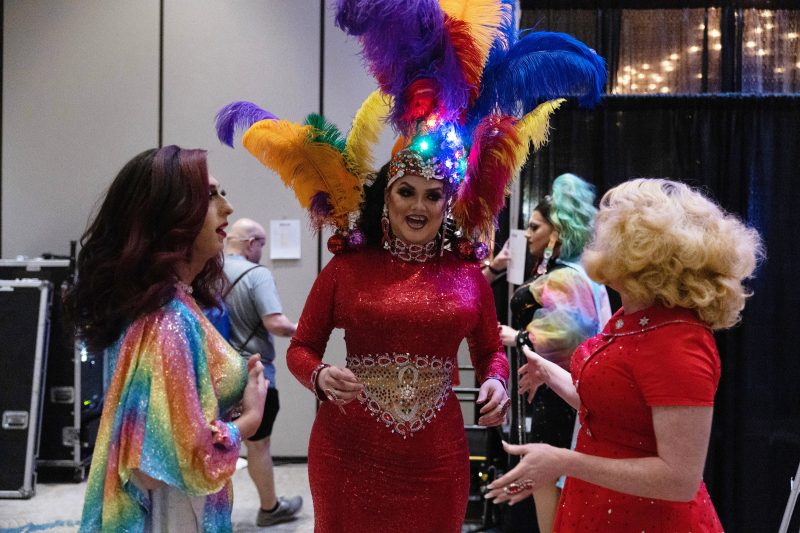The Supreme Court on Thursday refused to immediately clear the way for Florida officials to enforce a state law aimed at prohibiting children from attending certain live drag shows.
A lower court had blocked the law statewide, saying it likely violated the First Amendment and was “specifically designed to suppress the speech of drag queen performers.”
In a statement accompanying the Supreme Court order, two justices who were in the majority — Brett M. Kavanaugh and Amy Coney Barrett — said their refusal to reinstate the Florida law does not reflect their view about whether it violates the First Amendment.
Three other justices — Clarence Thomas, Samuel A. Alito Jr. and Neil M. Gorsuch — indicated they would have allowed the law to take effect while the litigation continues.
Florida Gov. Ron DeSantis, who is seeking the Republican presidential nomination, in May signed the measure prohibiting the admission of children into any sexually explicit show that could be considered obscene based on the age of the child.
The law does not specifically mention drag shows, but allows state officials to impose fines and suspend the business and liquor licenses of restaurants that allow children to attend performances that include lewd exposure to “prosthetic genitals and breasts.”
An Orlando restaurant, Hamburger Mary’s, presents drag shows, comedy sketches, dancing, and, on Sunday afternoons, what it describes as family-friendly drag shows. The restaurant, part of a chain of drag-themed establishments, sued state officials, challenging the constitutionality of the law, which it said would result in a loss of business.
A district court judge in June sided with Hamburger Mary’s and barred state officials from enforcing the law in a preliminary order. That ruling found the statute likely violates the First Amendment in part because its vague language does not define “lewd conduct” or “lewd exposure.”
The opinion quoted the bill’s sponsor, who described the measure as protecting “our children by ending the gateway propaganda to this evil — ‘Drag Queen Story Time.’” Before the order was issued, Florida’s Department of Professional and Business Regulation had already moved to revoke the liquor licenses of a Miami hotel and an Orlando performing arts venue for hosting drag shows where children may have been present.
U.S. District Judge Gregory A. Presnell noted that Florida law permits any minor to attend an R-rated film at a movie theater if accompanied by a parent or guardian — films, he said, which “routinely convey content at least as objectionable” as that covered by the new law.
Presnell also said the new law clashes with another DeSantis priority, the “Parents’ Bill of Rights,” because it allows the state to decide what performances children can attend, rather than leaving that choice up to parents. He added that existing obscenity laws already protect children from “any constitutionally unprotected obscene exhibitions or shows.”
A divided panel of the U.S. Court of Appeals for the 11th Circuit affirmed Presnell’s order and sided with the restaurant.
In dissent, Judge Andrew Brasher said he would have allowed the state to continue to enforce the law against parties other than Hamburger Mary’s while the litigation continues.
“We have a single plaintiff that operates a single brick-and-mortar restaurant in a single city,” Brasher wrote. “An injunction addressed to everyone in Miami, Tallahassee, Jacksonville, Tampa, and everywhere else in Florida provides no benefit to that plaintiff and solves no administrability concern, but it nonetheless imposes significant burdens” on state officials.
Florida Attorney General Ashley Moody (R) asked the Supreme Court to intervene and limit the injunction to apply only to Hamburger Mary’s while the litigation continues. Blocking the measure entirely, she said in a court filing, “inflicts irreparable harm on Florida and its children by purporting to erase from Florida’s statute books a law designed to prevent the exposure of children to sexually explicit live performances.”
In response, the restaurant’s attorney Donald A. Donati urged the Supreme Court to continue to block enforcement of the law throughout the state. The restaurant’s shows are “not harmful to minors,” he said in a court filing, noting that parents and grandparents attend shows with their children. But the owners say they are concerned about violating the law because of its vague, broad language — and the loss of business if age restrictions are required.
Florida already has constitutional laws in place that prevent children from viewing sexually explicit materials, Donati wrote, and the state “will suffer no irreparable harm by maintaining the status quo for the duration of this litigation.”
As is typical when the court responds to emergency requests, the Supreme Court’s order on Thursday did not include the justices’ reasoning.
Kavanaugh, joined by Barrett, emphasized that the question of whether lower courts can block enforcement of a law against those not involved in litigation — businesses other than Hamburger Mary’s, in this case — is an important question that could warrant our review in the future.
But, he said, the Florida case is “an imperfect vehicle” for considering the question.
The case is Griffin v. HM Florida-Orl, LLC.

